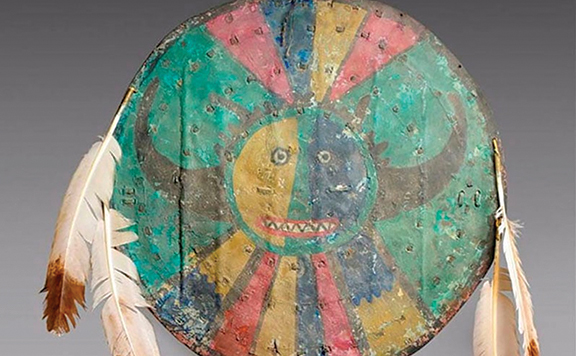
By Lee Egerstrom
President Joe Biden signed into law on Dec. 21 the Safeguard Tribal Objects of Patrimony (STOP) Act, bringing closure to a multiyear, bipartisan effort for legislation that can help tribes prevent the theft and sale of important cultural objects.
This was an especially significant achievement for Pueblo and other tribes of the American Southwest that have had highly visible artifacts stolen and put up for auction in Europe.
But it will help all Native tribes, everywhere, protect their cultural heritage and retrieve stolen objects and at the same time help protect gravesites from looters, said Jason Decker, an attorney with Patterson Earnhart Real Bird & Wilson LLP, also known as the Native Law Group, at its Minneapolis office.
Decker, a member of the Leech Lake Band of Ojibwe, practices in federal Indian law, litigation, tribal governance, legislation and code drafting, tribal-state relations, tribal law and policy development, and gaming issues. The firm has offices in Louisville, Colo.; Washington, D.C.: Fort Yates, N.D., and Minneapolis, Minn.
Tribes across the country, including Indigenous groups in Alaska and Hawaii, have all had problems with raided sacred artifacts, the law firm said in a background paper about the new law. Congressional sponsors of the legislation said the same as they saluted the legislation’s final, unanimous Senate approval on Nov. 29.
Washington, Boston and other newspapers around the U.S. and globally have focused on Native actions to reclaim stolen properties held in museums and in private collections. A number of successes have been found.
An example of the success included the pending return of remains and artifacts stolen from a gravesite at Wounded Knee from the 1890 Army massacre there in South Dakota. Details can be found in the Sioux Falls Argus Leader article at the end of this article. Theft and illegal marketing of Indigenous artifacts is as old as the history of war as invading forces have carried home souvenirs and other objects of value that could sold. This practice continues to this day following wars in Afghanistan, Iraq, Iran, Eastern Africa, and in various ethnic enclaves around the world.
A good look at the raiding of culture is offered by The Regulatory Review at the University of Pennsylvania (cited at the end of the article). The new law seeks to strengthen existing efforts by Congress and past national administrations to ban the theft and trading practices of Native American artifacts. The Archaeological Resources Protection Act (ARPA) for instance, forbids damaging or removing artifacts from federal and Native lands in the U.S., the report states. It also prohibits buying, selling, exchanging or transporting these items obtained illegally.
Meanwhile, another existing law probably has greater importance to tribes in Minnesota and surrounding states. The Native American Graves Protection and Repatriation Act (NAGPRA) provides methods for repatriation of artifacts held in museums and agencies that are federally funded. Penn archeologists noted that thousands of Native American artifacts, including human remains, have been stolen over the years from burial grounds.
Tribal leaders and their allies in Congress have been pushing for greater federal STOP Act-like protection since 2016.
This was after it was discovered an Acoma Pueblo ceremonial war shield, stolen from a home in the 1970s, had surfaced in Paris and was being put up for auction. The shield, more than 100 years old, was used by the Pueblo in cultural and religious ceremonies.
Sen. Martin Heinrich, D-N.M., introduced the initial bill. His chief collaborator in pushing the bill was Sen. Lisa Murkowski, R-Alaska. And in the House of Representatives, Rep. Teresa Leger Fernández, D-N.M., led the charge.
Key bipartisan lawmakers serving as cosponsors over the years included the late Rep. Don Young, R-Alaska, and Reps. Tom Cole, R-Okla., and Sharice Davids, D-Kan.; and on the Senate side, Sens. Jeff Flake. R-Ariz., Tom Udall, D-N.M, John Tester, D-Mont., Ben Ray Luján, D-N.M. and the late Sen. John McCain, R-Ariz.
Native Minnesotans and regional readers should know that all eight Minnesota House members and both Minnesota senators supported the bill on final passage in their respective houses. So did all members of Congress from the two Dakotas. But three Republican House members from Wisconsin and two Republican members from Iowa voted against the bill.
“Now that the President has signed the STOP Act into law, I look forward to working with the Biden Administration to implement this bipartisan legislation to prohibit the exporting of sacred Native American items and increase penalties for stealing and illegally trafficking Tribal cultural patrimony,” Heinrich said in a joint statement issued with Leger Fernández.
“With this new law, we have taken an important step forward in halting the illegal and immoral theft of items that Tribes have identified as essential and sacred pieces of their cultural heritage,” Heinrich said.
Leger Fernández, meanwhile, said the new law fills an important void.
“While the United States has laws to protect the cultural property of other countries, until the STOP Act, we had no law to specifically stop the export of Native American patrimony (heritage),” she said. “The perseverance of the Acoma people to recover a sacred shield that was stolen inspired this legislation.”
With help from the federal government, the auction of the Acoma Shield in Paris was blocked. It has since been returned to the Pueblo. But it wasn’t easy given holes in prior laws.
The New Mexico lawmakers said the STOP Act increases criminal penalties for people engaged in the illegal sale and transport of cultural objects and requires the Departments of Interior and State to participate in training and workshops on the voluntary return of human remains and cultural items.
The Interior Department will need to refer individuals and organizations to Indian tribes and Native Hawaiian organizations to facilitate voluntary returns of remains and items, and convene an interagency working group to carry this out.
In addition, the department was also instructed to form a Native working group for Native tribes and Native Hawaiians to provide advice on issues concerning returns of human remains and cultural items.
The new law adds teeth to penalties for participating in this illegal trade. It increases from five years to 10 years the maximum prison term for individuals convicted of “selling, purchasing, using for profit, or transporting for profit human remains or cultural items that were illegally obtained.”
The University of Pennsylvania Regulatory Review article can be found https://www.theregreview.org/2021/04/17/saturday-seminar-regulation-stolen-cultural-artifacts.
The Native Law Group report: https://nativelawgroup.com/congress-passes-safeguard-tribal-objects-of-patrimony-act.
The Sioux Falls Argus Leader article: https://www.argusleader.com/story/news/2022/11/04/remains-artifacts-from-wounded-knee-to-return-to-southdakota/69620132007.
The fight to reclaim a stolen totem pole from a Scottish museum: https://www.smithsonianmag.com/history/inside-the-nisgaa-nations-fight-for-the-return-of-a-36-foot-totem-pole-180981342.






